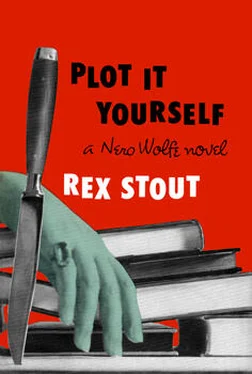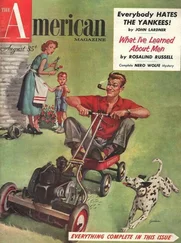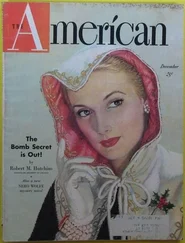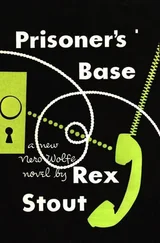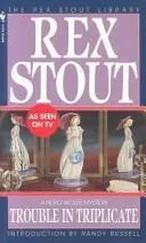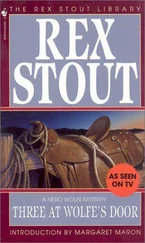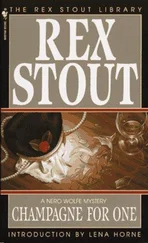There were murmurs, and Tabb tapped on the glass again. “Miss Wynn? Briefly, please.”
Amy Wynn’s nose had been twitching. Her clasped hands were resting on the edge of the table. She was up against it, since Reuben Imholf wasn’t there for her to look at. “I really don’t think,” she said, “that I should take a position on this. Because I’m in the same—”
“Louder, Miss Wynn, please.”
She raised her voice a little. “I’m in the same position that Mr. Oshin was. The man that made the claim against him is dead, but the woman that has made a claim against me, Alice Porter, is still alive. Nero Wolfe says that my case is different, that the story she bases her claim on wasn’t written by the man who wrote the others, that Alice Porter wrote it herself, but that doesn’t really matter, because he wrote the story that she used for her claim against Ellen Sturdevant, so if he’s caught and it all comes out she’ll be caught too, and I’ll be out from under too, as Mr. Oshin put it. So I still have a personal interest, a strong personal interest, and I don’t think I should take a position. Perhaps I shouldn’t be on the committee. I’ll resign if you think I ought to.”
“Damn fine committee,” someone muttered. “They’re all going to resign.” Harvey started to speak, but Tabb tapped on the glass. “We’re not through,” he said. “I’m going to ask our counsel to say a word about Mr. Harvey’s statement that it’s probably illegal for us to continue the arrangement with Mr. Wolfe and it might get us into serious trouble. Mr. Sachs?”
A compact, broad-shouldered guy about my age with sharp dark eyes passed his tongue over his lips. “It’s not a very complicated situation legally,” he said. “There should be a letter to Mr. Wolfe stating definitely and specifically that you have engaged him to investigate the plagiarism claims and nothing else. Then if he does something that causes him to be charged with some offense against the law, for instance withholding evidence or obstructing justice, no matter what, you wouldn’t be liable legally. Of course there could be bad publicity, there might be a stigma because you had hired him, but it’s not actionable to hire a man who breaks a law while he is in your employ unless his offense is committed under your direction or with your knowledge and consent. If you decide to send such a letter I’ll be glad to draft it if you want me to.”
Wolfe and I exchanged glances. He sounded exactly like Nathaniel Parker. Tabb spoke. “Apparently that settles that. I’m going to ask Miss Ballard what she thinks. She tried a couple of times to tell us, but we didn’t let her finish. Cora? Briefly.”
The executive secretary looked apologetic. She was tapping on a pad with her pencil. “I don’t know,” she said, “I guess the fact is I’m just afraid. I know Mr. Wolfe is a very brilliant man, I know a little bit about how he does things, I suppose you all do, and of course I’m not going to criticize him, he knows his business just as you know your business of writing, but I’d hate to have the association get involved in something sensational like a murder trial. One thing Mr. Harvey didn’t say, the New York police are working on this now, and since there have been three murders I think you can be pretty sure they won’t quit until they get the man they’re after, and since he’s the man we’re after too I shouldn’t think you’d have to pay a private detective to do what they’re doing.” She smiled apologetically. “I hope Mr. Oshin won’t mind if I don’t agree that you would be quitters.”
“I don’t agree either,” Philip Harvey blurted. “I don’t see how we could be expected—”
Tabb was tapping on the glass. Harvey was going on anyhow, but several of them shushed him. “I think we’ve covered the various viewpoints pretty well,” Tabb said. “Mr. Wolfe? If you care to comment?”
Wolfe’s head went from right to left and back again. Those with their backs to us twisted around on their chairs, “First,” he said, “I remark that with your books two of you have given me pleasure, three of you have informed me, and one of you has stimulated my mental processes. Two or—”
“Name them,” the famous woman novelist demanded.
Laughter. Tabb tapped on the glass.
Wolfe resumed. “Two or three of you have irritated or bored me, but on balance I owe you much. That’s why I’m here. Having seen your names on the letterhead of your association, I wanted to prevent you from forsaking a responsibility. You are collectively responsible for the death by violence of three people.”
Five or six of them spoke at once. Tabb didn’t tap on the glass. Wolfe showed them a palm. “If you please. I merely stated a fact. You appointed a committee for a specific purpose. Pursuant to that purpose, the committee hired me to investigate. It provided me with the record — various documents and other material, Studying it, I formed a conclusion that should have been reached long ago: that the three first claims of plagiarism had all been instigated by a single person. I procured more material, books written by the claimants, and formed a second conclusion: that none of the three claimants had been the instigator. That changed completely the character of the investigation. It widened its scope so greatly that I told the committee it was no longer my kind of job. It was a member of the committee who suggested a plan to beguile one of the claimants, Simon Jacobs, into turning informer. At the request of the committee, reluctantly, I agreed to carry out the plan, which by its nature had to be imparted to various people. Forty-seven persons knew of it within a few hours. As a direct result of the plan Simon Jacobs was killed before Mr. Goodwin got to him; and as a further direct result, because the man we were after feared that a similar plan would be tried on Jane Ogilvy or Kenneth Rennert, they too were killed.
Wolfe’s head went left and right again. “I repeat that the conclusions I formed should have been reached long ago, if a competent investigation had been made. The evidence on which they were based had been at hand, all of it, for more than a year. Because of those conclusions, formed in my pursuit of the stated purpose of the committee, and because of a plan of procedure approved by your committee and suggested by one of its members, Mr. Oshin, three people were killed. You are now considering whether or not to scuttle. That might be prudent; certainly it would not be gallant; some might think it less than honorable. I submit it to your judgment. Mr. Harvey. Do you challenge any of my facts?”
“Your facts are straight enough,” Harvey conceded, “but you left one out. You told us yourself that you failed to function properly. You admitted that but for your default Jacobs would still be alive. Are we responsible for your blunder?”
“No.” Wolfe was blunt. “With the plan known to so many, I should have taken precautions to safeguard Mr. Jacobs from harm. But you have shifted your ground. My default does not relieve this body of its responsibility. If you wish to dismiss me for incompetence I offer no objection, but then, to honor your obligation, you’ll have to hire somebody else. Mr. Tabb. You invited my comments and I have made them.” He stood up. “If that’s all—”
“Wait a minute.” Tabb’s eyes moved. “Do you want to ask Mr. Wolfe any questions?”
“I have one,” a man said. “Mr. Wolfe, you heard Mr. Sachs’s suggestion, that we write you a letter saying that you are to investigate the plagiarism claims and nothing else. Would you accept such a letter?”
“Certainly. If I get the swindler, which will satisfy you, I’ll also get the murderer, which will satisfy me.”
“Then I make a motion. I move that we instruct the chairman of the committee to ask Mr. Sachs to draft the letter, and sign it and send it to Nero Wolfe, and tell him to go ahead with the investigation.”
Читать дальше
